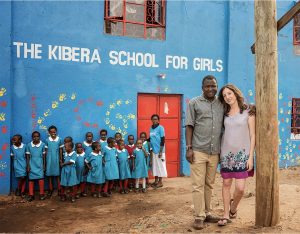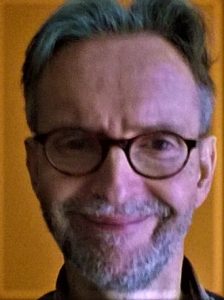Monday
Community ArticlesUbuntu: “I had nothing but I believed in the power of my people.”

Photo Credit NaomiW25 on Wikimedia Commons
By Hans Kaufmann
Este artículo ha sido traducido al español aqui.
When I worked with children in the Shambhala Center in Vienna, stories were always an important and requested part of our meetings. During the last years they were around 10 and they manifested vivid inquisitiveness and interest in foreign countries and what happened in the greater world in general. I was always looking for stories, which might be interesting for them. Once I found the story of Kennedy Odede and his SHOFCO (“Shining hope for communities”) project in Kibera, a big slum in Nairobi (described in A path appears, by Nicholas D. Kristof and Sheryl WuDunn). This was the story, the kids were most impressed of – and I think it’s not only a story for kids.
One question, which was amazing for them was: how could a human being who had grown up in an degraded environment, full of violence and drug abuse, who suffered from a lack of basic human needs such as food, healthcare and education, rise to become a powerful, compassionate and humorous leader and facilitating sustainable community change towards a more healthy, peaceful and dignified society? The children felt that to be heroic and almost incredible. It might as well read incredible for many of us, used to and bombarded every day by so many bad news. But there are obviously still good news in this world and this story is definitely one of them. As Shambhalians you might easily recognize: it is a story about basic goodness, confidence and principles of enlightened society, like a lotus, naturally emerging out of the mud.
Born in a little village in Kenya, as the first child of a 15 year old mother, Kennedy escaped from being killed (according to the traditions of his tribe) only through the lucky chance that he was born feet first. That was regarded as a sign which indicated that he would become a great leader. And, that is why they gave him the name Kennedy.
Initially, his mother and grandmother cared lovingly for him. But that situation changed abruptly when, at the age of 3, his grandmother died and famine forced his family to move to another place that appeared to offer more promise for a better life. They moved to the capital, Nairobi. But, instead of a better life, they ended up in Kibera, Africa’s biggest slum. Kennedy was beaten continuously and severely by his stepfather; and he had to watch helplessly as his mother and sisters were abused and raped. He was not able to protect them.
The basic needs of the growing family of 8 children were never satisfied. They never had enough to eat and Kennedy, at the age of 10, decided to become a street child. Once, hunger drove him to steal a mango on a marketplace. When he was caught, the angry mob almost beat him to death. A priest interfered and saved his life. „For every person I encountered who hurt me and caused me pain, I also met a lot of good people. For the priest, that abused me, I met a man of god who saved my life on the day I stole a mango…“. He joined a gang and, in order to forget the painful situation he was in, he consumed drugs, sniffing glue and petrol. “I’m not proud of this, but eventually I learned a trick: replace my destructive addiction with a positive one: an addiction to books.“
Since his earliest years, Kennedy had manifested a great passion for learning and he longed for education – to learn to read and write, etc. But that was not possible, because he had no money to pay for a school. So he tried to learn from old newspapers he found in the trash and, with the help of friends who had the privilege to attend school, he learned to read and write. At some point a foreigner gave him some books, among them writings from and about Nelson Mandela and Dr. Martin Luther King. Reading them kindled the fire of his inspiration and confidence to engage in working towards a positive change in his environment tremendously.
As he knew that he could accomplish nothing alone, he increasingly engaged in networking, collecting friends around him, in order to bring hope into the minds and lives of his comrades. First – using a football bought with money he had earned working 14 hours a day for one dollar – he founded a soccer group. Then he formed a street theatre group, which went into the slums and mirrored scenes and circumstances of life happening there; the group explored topics like gender violence and HIV/Aids, etc. It was street theatre that brought him together with Jessica Posner, a student from Denver, who was interested in those activities.
Courageously, and against Kennedy’s resistance, she dared, as one of the first outsiders to live in the slum for some time. Jessica and Kennedy fell in love and became a couple. She helped him apply to Wesley College, USA and he graduated in 2012. Shortly afterwards they married, started the Kibera school for girls and published a book, which tells their story and describes their work. (Find Me Unafraid – Love, Loss, and Hope in an African Slum by Kennedy Odede, Jessica Posner). They called the organization they founded SHOFCO, which means “Shining hope for communities.” It is dedicated to the goal of “transforming urban poverty to urban promise.” (Visit www.shofco.org to find out more about their wonderful activity and their vast vision.)
To conclude, here are some quotations which reflect some of Kennedy’s and the SHOFCO team members’ views and principles:
Kennedy was convinced, that “there is a sickness, killing even more people than poverty does: hopelessness!”
“I always woke up very early, around 4 o’clock in the morning, determined to make something better out of the coming day compared to the past day.”
“I tried to appreciate things like the sunrise, something that everyone in the world shares and can find joy in, no matter if you are poor. Seeing the sunrise was always healing for me, it was a beauty to behold.”
“I grew to know that no situation lasts forever. I used to tell myself that even when the day felt dark, eventually the light would somehow come. Nothing is constant.”
“SHOFCO saved my life and helped me to be positive even when the worst happened. It made me feel not like a passive victim, but like I had agency and power to change what was happening in my community.”
—Kennedy Odede
“Where there is hope, nothing is impossible” – Joyce Ndungwa, IT Director.
“No act of kindness, no matter how small, is wasted” – Eleen Were, Facilities and Maintenance Manager.
“Sustainable change comes from within” – Mona W. Karingi, Director of Marketing & Partnerships.
“I think SHOFCO also gave me a sense of the power of Ubuntu, feeling connected to a universal humanity”
—Kennedy Odede
 Dr.Hans Kaufmann is a psychotherapist and a student of Chögyam Trungpa Rinpoche
Dr.Hans Kaufmann is a psychotherapist and a student of Chögyam Trungpa Rinpoche
and Sakyong Mipham, Rinpoche since 1983. He is a member of the Shambhala Center Vienna.





Feb 27, 2020
Reply
D’accord, Christine! And if you watch out, you see more and more of them……
Feb 25, 2020
Reply
Hans, Thank you for sharing this story. It is so important to tell the stories of basic goodness, to change the narrative that prevails in our society. Stories go straight to the heart and are easily remembered and retold. Please everyone tell the stories of basic goodness.
Feb 21, 2020
Reply
Then it was already useful. Thank you, Sara!
Feb 21, 2020
Reply
Danke Sabine. Gute Frage! Kommt mir auch so vor…
Feb 21, 2020
Reply
This is beautiful and inspirational. Thank you for sharing.
Feb 21, 2020
Reply
Thank you for sharing this great story with the meaningful quotations. Sometimes I ask myself if a motivation, like this “I always woke up very early, around 4 o’clock in the morning, determined to make something better out of the coming day compared to the past day.” is killed through a quite comfortable life that many of us have in the “western world”. O better said : How can I sustain such a motivation in my comfortable life?